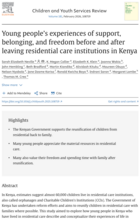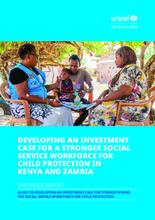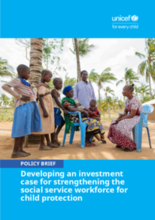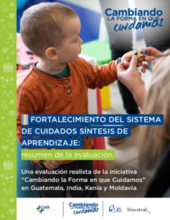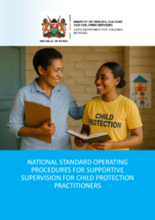This country page features an interactive, icon-based data dashboard providing a national-level overview of the status of children’s care and care reform efforts (a “Country Care Snapshot”), along with a list of resources and organizations in the country.
demographic_data
childrens_living_arrangement
children_living_without_bio
adoption
social_work_force
key_stakeholders
Key Stakeholders
Add New DataOther Relevant Reforms
Add New Datadrivers_of_institutionalisation
Drivers of Institutionaliziation
Add New Datakey_research_and_information
Key Data Sources
Add New DataChildren's Act, 2022 (Kenya)
Prevalence and number of children living in institutional care: global, regional, and country estimates
Social Protection and Disability in Kenya
Kenya Social Protection Sector Review
Country Care Review: Kenya
Child Developmental Disabilities, Caregivers’ Role in Kenya and Its Implications on Global Migration
Research findings on Alternative care system in Kenya for children without parental care
Charitable Children Institutions in Kenya: Factors Influencing Institutionalization of Children
Acknowledgements
Data for this country care snapshot was contributed by consultants with Maestral International.
Displaying 1 - 10 of 448
In Kenya, young people’s experiences of residential care and life after leaving care highlight trade-offs between material support, emotional guidance, and personal freedom. The study emphasizes that family strengthening and individualized case management are crucial to support children reunifying with families and successfully transitioning out of residential care.
This article argues that visiting orphanages in Kenya during holidays or as part of voluntourism, while seemingly charitable, can actually harm children by perpetuating a system that values short‑term attention over stable, family‑based care and s
A strong social service workforce (SSW) is the backbone of effective child protection systems. Across Eastern and Southern Africa, social service workers play a critical role in preventing and responding to violence, abuse, neglect, and exploitation of children. Yet, the workforce remains underfunded and understaffed, limiting its ability to deliver essential services. To address this gap, UNICEF Eastern and Southern Africa Regional Office (ESARO) has developed this Synthesis Report , providing a detailed guide to developing an investment case, drawing on lessons from Kenya and Zambia.
A strong social service workforce (SSW) is the backbone of effective child protection systems. Across Eastern and Southern Africa, social service workers play a critical role in preventing and responding to violence, abuse, neglect, and exploitation of children. Yet, the workforce remains underfunded and understaffed, limiting its ability to deliver essential services. To address this gap, UNICEF Eastern and Southern Africa Regional Office (ESARO) has developed this Policy Brief summarizing the rationale and approach for building an investment case for strengthening the SSW.
Cambiar la Forma en que Cuidamos (CTWWC, por sus siglas en inglés) es una iniciativa global que promueve un cuidado familiar seguro y afectuoso para los niños.
The Kenyan government has announced a plan to gradually reintegrate about 44,000 children currently living in private orphanages and children’s homes back to their families by 2032, under its 10‑year National Care Reform Strategy.
These SOPs aim to strengthen the effectiveness and well-being of Kenya’s child protection practitioners by promoting accountability, continuous learning, and reflective practice. By prioritizing practitioners’ psychosocial health and standardizing supportive supervision across the State Department for Children Services, the guidance seeks to improve service quality, reduce burnout, and enhance outcomes for vulnerable children.
This package of materials encompasses a comprehensive costing framework for scaling two key care reform models implemented by the Changing the Way We Care initiative in Kenya—Kafaalah and Case Management for Reintegration.
Changing the Way We Care’s “Care System Strengthening Learning Synthesis: Evaluation Summary” distills lessons from care reform efforts in four countries, examining how change happened across laws, workforce, financing, monitoring, and services. It finds that evidence-based advocacy, strong government ownership, collaboration, and capacity-building were central to driving and sustaining reform across diverse contexts.
On October 23, 2025, the Transforming Children’s Care Collaborative hosted a webinar exploring Kafaalah—a long-standing childcare practice in Muslim communities that has been observed for more than 1,400 years.

